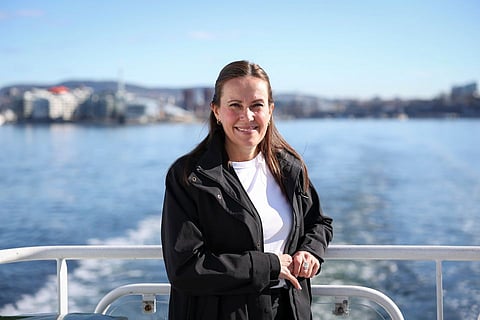

Norwegian Minister of Fisheries and Oceans Marianne Sivertsen Næss.
Photo: NFD / David Berg.
The future of aquaculture in Norway depends, in large part, on the future of offshore aquaculture. This is the Norwegian government's understanding and, as a result, the Ministry of Trade, Industry and Fisheries this week presented a proposal for thematically overarching competency requirements that must be met before an operator can participate in the competition for area allocation.
"Offshore aquaculture is a major opportunity for sustainable food production in Norwegian marine areas, and it requires substantial regulatory development to support it," said the Norwegian Minister of Fisheries and Oceans, Marianne Sivertsen Næss.
"The proposal is yet another milestone in this work, and I am very pleased to be able to send new signals to the operators who I know are working strategically and purposefully to be part of this new opportunity in our marine areas," she added.
The Minister also recalled that the proposal, which opened for consultation this week and has a deadline of September 17, is open to everyone. "I hope we receive many valuable contributions," Sivertsen Næss said.
Current regulations on offshore aquaculture in Norway allow for the allocation of individual sites. In contrast, the changes now proposed by the Ministry of Fisheries and Oceans would make it possible to allocate larger areas, with responsibility for development resting with the operators, with a more long-term perspective.
Within each assigned area, operators should develop comprehensive plans with well-organized location structures, primarily to ensure biosecure operations within the areas.
That is, the changes would allow not only the allocation of larger areas, but also the obligation to develop a plan for the establishment, development, operation, and decommissioning of offshore aquaculture within those areas.
"This is intended to ensure a biosecure and sustainable development of the areas being opened for this new activity," Minister Sivertsen Næss explained. "By allocating larger areas, we are also facilitating industrial development and laying the foundation for establishing infrastructure for offshore aquaculture," she concluded.
In its note announcing the opening of the proposal for consultation, the Ministry of Fisheries and Oceans recalled that, from smolt production, wellboats or other dedicated vessels to support offshore operations, to suitable facility technology and the transport of slaughter fish, the development of offshore aquaculture will require the establishment of an entirely new infrastructure.
In its vision, by allocating larger areas, operators will have room for long-term planning for phased development. This will be organized through an area plan in which the operator will need to incorporate all relevant regulatory requirements as the project matures.
The knowledge gained through the projects should be included in the plans and form the basis for a sound siting structure, which also takes into account coexistence with other activities at sea. In this way, the Ministry of Fisheries and Oceans explained, the area plans will provide a solid basis for dialogue and knowledge sharing with the authorities and other actors operating on the high seas.
"Offshore aquaculture will require a high level of expertise," the Ministry stated in its note, adding that the requirements will be spelled out more specifically in the regulation setting the rules for the competition.
In addition, along with planning, projects must also demonstrate that they are sustainable. Sustainability is a fundamental pillar in the Norwegian government's Fisheries and Oceans policy, which has also made it the focus of its proposed new regulation for traditional aquaculture presented in April and which, after the agreement reached earlier this month by most political parties, is still going ahead after its successful passage through the Norwegian Parliament last week.
